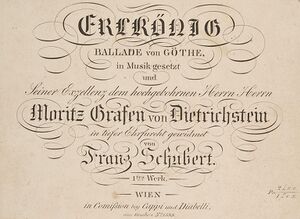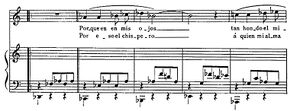Der Erlkönig
| Der Erlkönig | |
|---|---|
| by Franz Schubert | |
 Title page of the first edition of Schubert's "Erlkönig" | |
| English | Erlking |
| Catalogue | D. 328 |
| Opus | Op. 1 |
| Genre | Lied |
| Language | German |
| Composed | 1821 |
"Der Erlkönig" (eng.: Erlking) is arguably the most famous German ballad. Goethe describes a nightly ride on horseback. A father tries to reach his home, his feverish child in his arms. The story of the Erlkönig derives from the traditional Danish ballad Elveskud: Goethe's poem was inspired by Johann Gottfried Herder's translation of a variant of the ballad.[1] The poem was originally written by Goethe as part of a 1782 Singspiel, Die Fischerin (The [female] Fisher). It has been set to music many times. Best known is the version by Franz Schubert.
The poem is not only gripping for its dire theme (a sick child who dies in the end, the sudden end a depiction of the emptiness and horror the father must feel. The son's and the father's view of the world occur at the same time; the father's assurance that his sons' visions are just fantasies and cannot hurt him are demonstrably not true.
The piece requires the singer to take more than one role. This frequently occurs in songs (Der Tod und das Mädchen, Das Heideröslein), but the dramatic exchange of the Erlking, the father, and the son still create a special challenge for the singer.
There is also another aspect to the song. The way the Erlking is characterized bears similarities to how an abuser might act. The Erlkönig first tries to bribe the child, sweet-talking and acting as a child himself. He then raises his bid to golden fabrics and girls for company (the Erlking's daughters). When this also fails, he admits his physical attraction and resorts to brute force.
Der Erlkönig
It appears on the following album:
| Year | Album | With |
|---|---|---|
| 2021 | À sa guitare (Album) | Thibaut Garcia |
"Der Erlkönig" is part of the following concert program:
| Year | Album | With |
|---|---|---|
| 2021 | À sa guitare (Concert program) | Thibaut Garcia |
Libretto
Franz Schubert (music), Johann Wolfgang von Goethe (words)
Wer reitet so spät durch Nacht und Wind? | |
Manuscripts and sheet music
Voice/piano:
- Opus/Catalogue Number H. 136
- I-Catalogue Number IEG 25
- Movements/Sections 12 songs
- Year/Date of Composition 1914
- Librettist Fernando Periquet (1873-1940)
- Language Spanish
- Publisher Info. Madrid: Unión Musical Española, n.d.(ca.1915).
- Reprinted Boca Raton: Masters Music Publications, n.d.
- Copyright: Public Domain[2]
References
- ↑ Cite error: Invalid
<ref>tag; no text was provided for refs namedWiki - ↑ Granados, Enrique. "Erlkönig". IMSLP. Archived from the original on October 1, 2021. Retrieved October 1, 2021.
